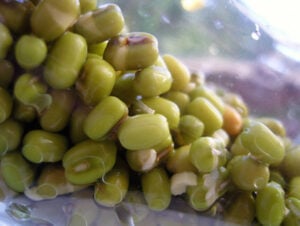Mung Beans: The Superfood Bean You’re Probably Missing Out On

Mung beans are a new addition to my diet. I first got wind of them when I was looking for a gluten-free pasta. I found a mung bean pasta, and I quickly became hooked. However, I always wondered what the bean itself looked and tasted like, and my curiosity led me to my latest superfood obsession. Mung beans are filling, full of both protein and fiber (and a lot of each!) and absolutely delicious and versatile. Here’s what mung beans are all about and how you can benefit in huge ways from them.
In 100 grams of mung beans, there are 347 calories, 1.2 grams of fat, 1,246 milligrams of potassium, 16 grams of dietary fiber, 24 grams of protein, 13 percent of the RDA of calcium, 37 percent of iron, 20 percent of vitamin B-6 and 47 percent of magnesium. It is chock-full of nutrients that offer the necessary protein for a plant-based diet. You can’t beat those stats!
Mung beans offer an array of benefits. One of their most prominent perks is their ability to lower cholesterol. Fermented mung bean extracts have shown the ability to lower cholesterol, triglyceride and LDL (aka “bad”) cholesterol levels. This is great news for those looking for bulk without excess fat intake – mung beans offer density and texture to the diet, keeping you satiated while still improving your health.
Studies have hinted at the importance of beans in supporting cancer prevention. In one study, women who ate four or more serving of legumes per week had a 33 percent less likely chance to develop colorectal adenomas, a non-cancerous tumor, than those who consumed one serving or less per week. The National Cancer Institute shows that for those who had previously had colon adenomas, those who increased their consumption of beans were 45 percent less likely to face a recurrence of it.
Studies have also shown the cardiovascular benefits of mung beans. Four or more servings of legumes per week were enough to decrease the risk of heart disease by 22 percent compared to those who eat legumes less than once per week in a large national survey.
Fermented mung bean extracts have also exhibited the ability significantly reduce blood sugar levels in mice, making them an exceptional complement to a diabetic diet. Mung beans additionally promote antifungal activity.
Mung beans are not short of iron, a particular essential mineral that makes the oxygen-carrying proteins hemoglobin and myoglobin. It is essential in muscle integrity. Mung beans’ magnesium content is also important in affecting muscle function and oxygen uptake. It balances electrolytes and increases energy, especially in order to stimulate exercise. Magnesium deficiency is one of the core conditions that lead to the development of osteoporosis, so it is important to get enough. Mung beans offer a high concentration of magnesium in each bite!
However, it would be a crime not to address the fact that mung beans offer more potassium than you ever thought you needed. Adequate potassium intake lowers blood pressure, reduces cardiovascular disease mortality and prevents kidney stones.
Are you ready to add mung beans to your diet?
Related on Organic Authority
Meatless Monday: 4 White Bean Recipes
Photo Credit: Hilary Perkins

